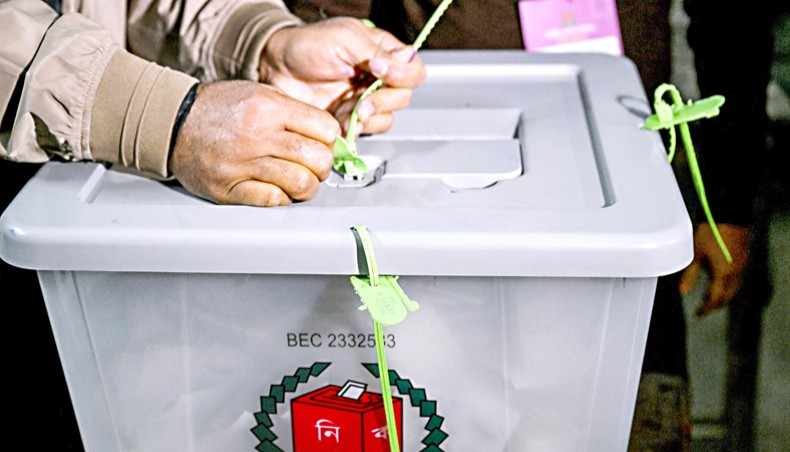
— Agence France-Presse
Monwarul Islam : WHEN the Awami League is in a self-congratulatory mood, indulging in complacence over its success in pulling off the 12th national elections, not even its own members and associates see it as a credible election, not to speak of the public perception that sees it for what it is — non-participatory, non-inclusive and managed election.
Even though the opposition parties, including the Bangladesh Nationalist Party, boycotted the election, rendering it virtually non-participatory and one-sided, the Awami League, which fielded independent candidates from the party, the ‘dummy candidates’ in the words of AL president Sheikh Hasina, to make the elections appear participatory and competitive, could not make the elections free and fair and could not attract voters.
The elections were marked by a tellingly low voter turnout — the Election Commission has claimed that more than 41 per cent of votes were cast while independent observers and real-time media coverage make it abundantly clear that at best 15–20 per cent of votes were cast. Vote rigging and ballot stuffing were also reported widely, with dozens of videos of fake voting making the rounds on social media, suggesting that many of the votes cast were in fact fake votes.
Besides, casting fake votes that led the law enforcers to arrest 42 people, half a dozen people were killed and scores of others were injured in clashes between activists of the Awami League and its independents, or Jatiya Party candidates. At least 44 candidates in different constituencies across the country boycotted the election on the day, bringing various allegations, including vote rigging and irregularities in the polls.
Candidates participating in the elections also alleged gross violations of the electoral code of conduct, vote rigging, violence and intimidation. Such allegations, which came not only verbally but also in written statements, came from among independent candidates, candidates from other parties that participated in the elections after promises of seats from the Awami League, and even from the Awami League candidates.
To begin with, members of the Jatiya Party, contrary to its own supporters’ expectations, went to participate in the elections after several rounds of talks with the Awami League, which eventually agreed to give it 26 seats in parliament and withdrew the Awami League’s candidates from the seats. Independent AL candidates, however, contested those seats, leaving the Jatiya Party cornered with only 11 seats.
An aggrieved Jatiya Party chairman GM Quader raised allegations of gross violations and termed the elections ‘destructive of the country’s democracy’. He also termed the elections unacceptable.
On January 8, the Jatiya Party chairman said that the election would not be acceptable as it was held under the control of the ruling Awami League government.
‘The election was held under the control of the government, so I believe it will not be acceptable. The government did what it needed to win, as and where necessary, and where it wanted to,’ he said.
He also said that a vested quarter was involved in destroying the democracy, and the government patronised it. He also alleged that the atmosphere was not conducive to fair elections and that the administration was not neutral and worked for AL candidates and independents.
Another Jatiya Party candidate, Barrister Shamim Haider Patwary, who contested and lost in the Gaibandha 1 constituency, alleged vote rigging. He alleged that fake votes were cast in favour of an independent AL candidate. A number of other Jatiya Party candidates also made allegations of vote rigging and intimidation by AL activists.
The party, with its record low win, appears to be what its chairman says ‘sacrificed’ after being drawn into the race to legitimise a one-sided election.
Allegations came from candidates from parties allied with the Awami League. The Jatiya Samajtantrik Dal president and Awami League-nominated candidate for the Kushtia 2 constituency, Hasanul Haq Inu, has also alleged that he was defeated in the election through vote rigging.
In a post-election meeting on January 9, Inu said, ‘I was defeated by rigged votes, not by the people’s vote. I hope everyone will investigate this matter and rectify it’.
Besides vote rigging, Inu also alleged that AL activists, who worked for the independent AL candidate, took recourse to attack, threats and torture and created an atmosphere of fear that barred people from exercising their voting rights.
The Workers Party of Bangladesh candidate Fazle Hossain Badsha, who contested in the polls with the boat symbol, also made allegations of irregularities and intimidation that ultimately resulted in his defeat in the Rajshahi 2 constituency to an independent Awami League candidate.
Badsha made the allegations in a letter submitted to the chief election commissioner. In the letter, Badsha alleged that his voters faced threats and could not go to polling centres, resulting in a poor turnout in the election. He also alleged that the independent AL candidate used ward councillors, employees, and beneficiaries of Rajshahi City Corporation in the election.
Anwar Hossain Manju, who contested with the boat symbol, official symbol of the Awami League, also alleged irregularities, especially the use of money and intimidation.
Most allegations have, however, come from independent candidates. Independent candidate for the Rajbari 2 constituency Noor E Alam Siddiqui Haque, also the central organising secretary of Krishak League, an associate organisation of Awami League, alleged that Awami League activists intimidated voters, drove out his agents, and cast fake votes. He is also reported to have applied to the Election Commission to cancel the results of his constituency and demanded a re-election.
Independent Awami League candidate Parvez Anwar, who contested in the Kushtia 3 constituency, staged a protest and demanded the cancellation of the gazette, alleging vote rigging in the constituency. Parvez, in a written protest to the returning officer, alleged that Awami League activists and supporters took control of most of the polling centres on the day of voting and cast fake votes.
Among others, independent candidates for Pabna 3 and Faridpur 2 also alleged irregularities and demanded re-election.
Allegations also came from the small parties that were hurriedly and controversially given EC registration.
The secretary general of the Trinamool BNP, Taimur Alam Khandakar, termed the election a ‘staged’ one. After losing by a huge margin in Naraynganj-1 constituency, he termed the election ‘a Awami League versus Awami League show’ and observed that the country has entered into a one-party system.
Candidates from the Bangladesh Nationalist Movement termed the election ‘a festivity of vote rigging’. The acting chairman and secretary general of the party alleged ballot stuffing.
Another defeated independent candidate, Major Akhtaruzzaman, a former BNP leader, regretted that people have rejected the election and have not come to exercise their voting rights.
Madaripur 3 Awami League candidate Abdus Sobhan Golap, in a press conference at Madaripur Press Club two days after the polls, alleged vote rigging. Golap alleged that supporters of his rival candidate took control of many polling centres and cast fake votes.
Allegations of violations of electoral codes also came from Awami League candidates. Sanjida Khatun of Dhaka 4, who lost to an independent Awami League candidate, alleged irregularities in many polling centers. She filed separate complaints with the returning officer and the chief election commissioner. She also filed a writ with the High Court.
Barguna 1 Awami League candidate Dhirendra Debnath Shambhu filed a written complaint with the returning officer, alleging widespread irregularities, including vote rigging. He alleged irregularities in vote counting.
Manikganj 2 Awami League candidate Momtaz Begum, who lost to an independent candidate of the Awami League, alleged electoral fraud.
Even some winning candidates of the Awami League also alleged electoral fraud. Hasan Mahmood Ali, who has taken the oath as the new finance minister, alleged that his rival candidate indulged in buying votes.
Independent observers and organisations also found various forms of irregularities and termed the election a ‘staged’ one. Transparency International Bangladesh, in a study made public on January 17, said that the election was not free, fair and participatory and was contradictory to the spirit of the war of independence.
The anti-graft watchdog found that 100 per cent of the ruling Awami League candidates violated the electoral code of conduct at least once in the election, while candidates of other parties as well as independent candidates were not far behind in this regard.
The TIB study also found that the candidates had spent an average of Tk 1,56,83,777 in the election, which was six times higher than the expenditure limit of Tk 25 lakh set by the election commission.
TIB also observed that the Election Commission had acted as one of the catalysts for the implementation of a unilateral electoral agenda, sometimes intransigently, sometimes subtly, in the name of constitutional obligations and legal bindings. Other state institutions, particularly the law enforcement agencies and the administration, had been similarly used in supporting the same agenda.
The TIB study also observes that the elections have institutionalised the absolute control of the Awami League over the political arena and the governance system, have further expanded the way for the indiscriminate application of power without accountability, and that the election will forever be questioned by the standards of political integrity, democracy, and morality.
It so appears that the Awami League has failed to hold even the most farcical election in a free and fair manner.
New Age









